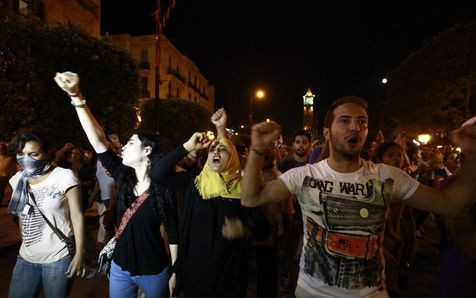Same Gun, Same Result: Murder Of Another Opposition Leader Triggers Huge Protests in Tunisia

Another killing of an opposition leader in Tunisia has sparked widespread protests and suspicions about the government’s possible complicity in the murder. On Thursday, Mohamed Brahmi, the leader of the opposition leftist People’s Movement party, was shot and killed as he sat in his car with his wife and children. An autopsy later revealed that he had been shot 14 times. Brahmi’s 19-year-old daughter, Balkis, said that during the shooting, she saw two men escape the scene on a Vespa. They were wearing black T-shirts and caps.
An investigation by the government subsequently revealed that the gun used to end Brahmi’s life was the exact same weapon that killed Brahmi’s predecessor, Chokri Belaid, in early February. “This information [about the gun] surprised us,” said Interior Minister Lofti Ben Jeddou at a press conference held on Friday in Tunis. “The weapon used, a [9-millimeter] semi-automatic weapon, was the same weapon used to assassinate the martyr Chokri Belaid. Not the same type, the same [exact] weapon, the same item.”
Ben Jeddou also named a suspect in Brahmi’s killing, a hardline Islamic fundamentalist Salafist named Boubacar Hakim. According to the French newspaper Libération, Hakim is a 30-year-old Frenchman, who has been expatriated in Tunisia for some time now. He has already been sought on suspicion of smuggling weapons from the neighboring country of Libya. Another man, Lufti Al-Zayn, is also mentioned as a suspect in the killing, according to BBC, while an additional six people are sought in connection with Thursday’s assassination.
However, Brahmi’s daughter Balkis, blames the ruling moderate Islamist Ennahda party for her father’s death. “Ennahda killed my father,” she told Agence France-Presse news agency. “I personally hold its leader, Rached Ghannouchi, responsible.” (Ennahda have rejected her accusations.)
Meanwhile, Brahmi’s death triggered massive protests all over the country with demonstrators asking for the resignation of the current Ennahda-led government. There were protests in the cities of Tunis, Sfax, Kef and Sidi Bouzid – Brahmi’s hometown and incidentally the birthplace of the Arab Spring Revolution in 2011. Police officers tried to repel civilians with tear gas. Two Ennahda’s offices were reportedly set on fire.
On Friday, the main trade union body, UGTT, called for a general strike, denouncing “terrorism, violence and murders” and the toppling of the current government. Most of the shops and banks in the country were closed, while all flights coming in and out of Tunisian airports were cancelled. Tunisia is observing a national day of mourning on Friday, according to Reuters. Brahmi’s funeral will take place on Saturday -- he will be buried near the tomb of Belaid. The Tunisian president, Moncef Marzouki, asked for a state funeral.
Ironically, Brahmi was not secular, according to reports, rather a practicing Muslim who did not criticize Ennahda as vociferously as Belaid had done. The death of Belaid in February also triggered mass protests five months ago and forced then-prime minister Hamadi Jebali to resign. Belaid was known to be a vocal critic of the former regime of Zine El Abidine Ben Ali, whose government was the first to be toppled during the Arab Spring revolutions. Ben Jeddou has said that Belaid was likely killed by members of a radical Islamist group called Ansar al-Sharia.
Now, in July 2013, as thousands gathered in the streets of Tunis, there are some fears that the current mass protests could escalate into the kind of violence witnessed in Egypt. But Ghannouchi, Ennahda’s party leader, does not think the killings will lead to massive turmoil. These killings [of Brahmi and Belaid] were designed to halt Tunisia's “democratic process and killing the only successful model in the region, especially after the violence in Egypt, Syria and Libya,” he told Reuters. “Tunisia will not follow the Egyptian scenario. We will hold on.”
Later this year, Tunisia will vote for a new constitution, as the presidential elections are scheduled for next year.
© Copyright IBTimes 2025. All rights reserved.






















